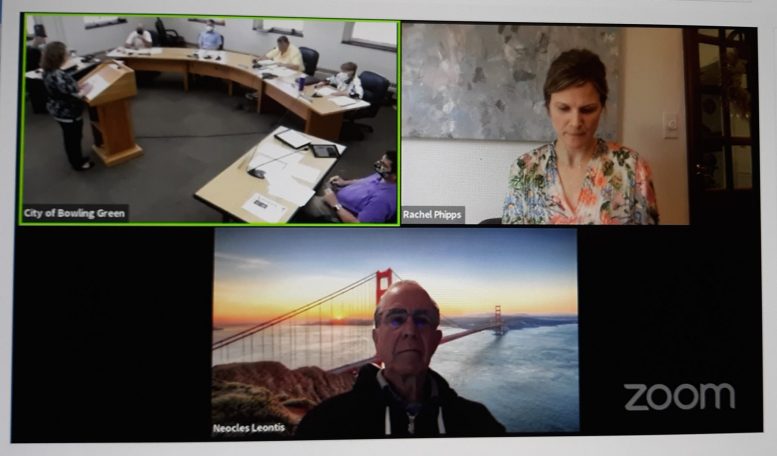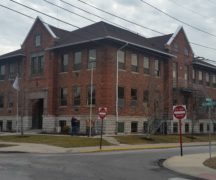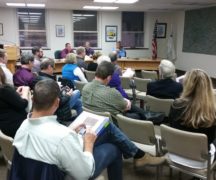By JAN LARSON McLAUGHLIN
BG Independent News
After two summers of crippling construction, followed by this year’s coronavirus pandemic, a DORA could help revive downtown Bowling Green.
Bowling Green City Council held a public hearing Monday evening for the proposed Designated Outdoor Refreshment Area in downtown Bowling Green.
The public comments were all supportive
The proposed DORA includes about 9.23 acres stretching from Clough Street on the south end to just north of Court Street on the north end. The DORA would allow customers at participating businesses to take alcoholic beverages outside during specific times and in specific areas.
Joe Spencer said the DORA could be a “great idea for the community,” especially on the heels of the construction and COVID-19.
Jay Williams asked why the DORA did not stretch to Wooster Green, one block west of Main Street, since special events are sometimes held there.
Council President Mark Hollenbaugh said the city wanted to “slow walk” the start of the DORA.
“That is definitely something that can be changed in the future,” Hollenbaugh said.
Mariana Mitova, of Clay Pot, formerly Naslada restaurant, thanked the city for its efforts to get a DORA downtown. The designation will help many businesses – not just those that sell alcohol – and will bring more of the community downtown, she said.
The only other public comment came from Don Scherer, representing the Black Swamp Green Team. One of the team’s goals is to eliminate single use non-compostable food packaging. Scherer asked that the city’s DORA cups be made of compostable plastics – with trash receptacles for them being set up in the downtown.
Municipal Administrator Lori Tretter said the city and Downtown Special Improvement District has already been researching the use of compostable cups for DORA.
City Council members had questions about enforcement of the DORA requirements – which only allow alcoholic drinks in certain areas at certain times. Tretter explained that violations would be treated as “open container” infractions by Bowling Green Police Division.
“Certainly this is new for all of us,” Tretter said.
It is up to businesses to make sure no one underage is served alcohol, she said.
“The onus is on the businesses,” Tretter said.
Police Chief Tony Hetrick said officers will not be confronting customers and asking for ID, unless they have a reason to be suspicious of the person’s age.
“We wouldn’t be carding people unless they appear to us as very underage,” Hetrick said.
Hollenbaugh pointed out that the hours of the DORA operations – ending at 10 p.m. – will help reduce problems of people passing drinks to underage consumers.
Hetrick agreed. “It’s before the prime bar time,” he said.
City Council can vote on the legislation at its July 6 meeting, then the paperwork will be sent to the state for approval.
In choosing to bring this forward at this time, the DORA applicants are aware that social distancing and adequate spacing for patrons in restaurants is critical. Allowing dining outside provides diversity of choice for customers patronizing downtown.
However, the applicants also have a long-term view of the benefits of a DORA in Downtown Bowling Green. Approval of a DORA is for the economic and cultural benefit of Bowling Green, according to the application.
The creation of a DORA is not just a matter of the city taking action. The businesses with liquor licenses in the footprint will have to apply to the state for approval. Those businesses granted approval would have a DORA designation added to their liquor licenses. They will use special cups for alcohol, that can then be taken outside by customers – within the allowed footprint.
Details about the DORA application can be found at https://www.bgohio.org/wp-content/uploads/2020/06/EDITED_WEBSITE_DORA-application-FINAL.pdf?x33100
According to the application, at least six businesses with liquor permits have expressed interest in participating. They are: Bar 149, Naslada, City Tap and the Attic, Doc’s, SamB’s, and Trotter’s Tavern. More can join later if they apply to do so.
Following are some details from the application:
- Signage: Plans call for at least 16 signs to be posted at the intersections and alley connections, to designate the boundaries of the DORA.
- Time of year: The DORA may be in operation annually from the Friday prior to Memorial Day weekend, until the end of day on the Monday of Labor Day weekend.
- Hours: The outdoor refreshment areas may be open Mondays through Thursdays, from 4 to 10 p.m., and Fridays through Sundays from 11 a.m. to 10 p.m. Last sales will occur no later than 9:30 p.m., and all cups must be disposed of by 10 p.m.
- Public safety plan: The Bowling Green Police Division commits to the continued patrol and monitoring of Bowling Green’s Downtown and the DORA as often as possible during times of DORA operation. The patrol of the area shall be tailored to be adequate and sufficient for public safety. For special events, businesses may need to contract with the city police. This security plan will be reviewed on an ongoing basis.
- Trash: The City of Bowling Green has 12 trash receptacles placed throughout the DORA located on both sides of North and South Main streets. Public Works will monitor the use of the receptacles during the DORA operation and may adjust frequency of collection during regular operation hours, if necessary. Establishments in the DORA that have liquor permits to serve alcohol on their premises shall maintain a trash receptacle of adequate size near the main entrance of the facility.
- DORA cups: All beer, wine or intoxicating liquor must be contained in the official cup of the DORA. Private property owners reserve the right to prohibit the consumption of alcohol on their property.
- Behavior: DORA participants are expected to follow all the rules of the DORA and maintain a decorum of good behavior, free of public drunkenness, property destruction, or any action that disrupts the enjoyment of another participant or disrupts any establishment, property owner, resident, visitor, passerby or patron within the DORA.





